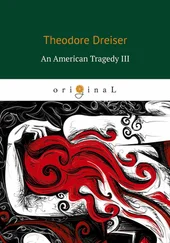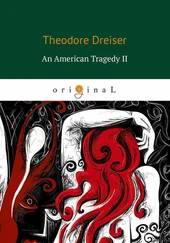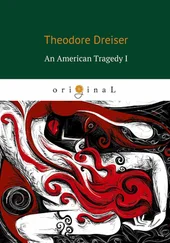Theodore Dreiser - An American Tragedy
Здесь есть возможность читать онлайн «Theodore Dreiser - An American Tragedy» — ознакомительный отрывок электронной книги совершенно бесплатно, а после прочтения отрывка купить полную версию. В некоторых случаях можно слушать аудио, скачать через торрент в формате fb2 и присутствует краткое содержание. Жанр: unrecognised, на английском языке. Описание произведения, (предисловие) а так же отзывы посетителей доступны на портале библиотеки ЛибКат.
- Название:An American Tragedy
- Автор:
- Жанр:
- Год:неизвестен
- ISBN:нет данных
- Рейтинг книги:5 / 5. Голосов: 1
-
Избранное:Добавить в избранное
- Отзывы:
-
Ваша оценка:
- 100
- 1
- 2
- 3
- 4
- 5
An American Tragedy: краткое содержание, описание и аннотация
Предлагаем к чтению аннотацию, описание, краткое содержание или предисловие (зависит от того, что написал сам автор книги «An American Tragedy»). Если вы не нашли необходимую информацию о книге — напишите в комментариях, мы постараемся отыскать её.
An American Tragedy — читать онлайн ознакомительный отрывок
Ниже представлен текст книги, разбитый по страницам. Система сохранения места последней прочитанной страницы, позволяет с удобством читать онлайн бесплатно книгу «An American Tragedy», без необходимости каждый раз заново искать на чём Вы остановились. Поставьте закладку, и сможете в любой момент перейти на страницу, на которой закончили чтение.
Интервал:
Закладка:
"And now remember," continued Hegglund, seeing that he himself was next, and cautioning him for the last time, "if dey wants drinks of any kind, you get 'em in de grill over dere off'n de dining-room. An' be sure and git de names of de drinks straight or dey'll git sore. An' if it's a room you're showing, pull de shades down to-night and turn on de lights. An' if it's anyt'ing from de dinin'-room you gotta see de headwaiter—he gets de tip, see."
"Front!" He was up and gone.
And Clyde was number one. And number four was already seating himself again by his side—but looking shrewdly around to see if anybody was wanted anywhere.
"Front!" It was Mr. Barnes. Clyde was up and before him, grateful that it was no one coming in with bags, but worried for fear it might be something that he would not understand or could not do quickly.
"See what 882 wants." Clyde was off toward one of the two elevators marked, "employees," the proper one to use, he thought, because he had been taken to the twelfth floor that way, but another boy stepping out from one of the fast passenger elevators cautioned him as to his mistake.
"Goin' to a room?" he called. "Use the guest elevators. Them's for the servants or anybody with bundles."
Clyde hastened to cover his mistake. "Eight," he called. There being no one else on the elevator with them, the Negro elevator boy in charge of the car saluted him at once.
"You'se new, ain't you? I ain't seen you around her befo'."
"Yes, I just came on," replied Clyde.
"Well, you won't hate it here," commented this youth in the most friendly way. "No one hates this house, I'll say. Eight did you say?" He stopped the car and Clyde stepped out. He was too nervous to think to ask the direction and now began looking at room numbers, only to decide after a moment that he was in the wrong corridor. The soft brown carpet under his feet; the soft, cream-tinted walls; the snow-white bowl lights in the ceiling—all seemed to him parts of a perfection and a social superiority which was almost unbelievable—so remote from all that he had ever known.
And finally, finding 882, he knocked timidly and was greeted after a moment by a segment of a very stout and vigorous body in a blue and white striped union suit and a related segment of a round and florid head in which was set one eye and some wrinkles to one side of it.
"Here's a dollar bill, son," said the eye seemingly—and now a hand appeared holding a paper dollar. It was fat and red. "You go out to a haberdasher's and get me a pair of garters—Boston Garters— silk—and hurry back."
"Yes, sir," replied Clyde, and took the dollar. The door closed and he found himself hustling along the hall toward the elevator, wondering what a haberdasher's was. As old as he was—seventeen— the name was new to him. He had never even heard it before, or noticed it at least. If the man had said a "gents' furnishing store," he would have understood at once, but now here he was told to go to a haberdasher's and he did not know what it was. A cold sweat burst out upon his forehead. His knees trembled. The devil! What would he do now? Could he ask any one, even Hegglund, and not seem—
He pushed the elevator button. The car began to descend. A haberdasher. A haberdasher. Suddenly a sane thought reached him. Supposing he didn't know what a haberdasher was? After all the man wanted a pair of silk Boston garters. Where did one get silk Boston garters—at a store, of course, a place where they sold things for men. Certainly. A gents' furnishing store. He would run out to a store. And on the way down, noting another friendly Negro in charge, he asked: "Do you know if there's a gents' furnishing store anywhere around here?"
"One in the building, captain, right outside the south lobby," replied the Negro, and Clyde hurried there, greatly relieved. Yet he felt odd and strange in his close-fitting uniform and his peculiar hat. All the time he was troubled by the notion that his small, round, tight-fitting hat might fall off. And he kept pressing it furtively and yet firmly down. And bustling into the haberdasher's, which was blazing with lights outside, he exclaimed, "I want to get a pair of Boston silk garters."
"All right, son, here you are," replied a sleek, short man with bright, bald head, pink face and gold-rimmed glasses. "For some one in the hotel, I presume? Well, we'll make that seventy-five cents, and here's a dime for you," he remarked as he wrapped up the package and dropped the dollar in the cash register. "I always like to do the right thing by you boys in there because I know you come to me whenever you can."
Clyde took the dime and the package, not knowing quite what to think. The garters must be seventy-five cents—he said so. Hence only twenty-five cents need to be returned to the man. Then the dime was his. And now, maybe—would the man really give him another tip?
He hurried back into the hotel and up to the elevators. The strains of a string orchestra somewhere were filling the lobby with delightful sounds. People were moving here and there—so well-dressed, so much at ease, so very different from most of the people in the streets or anywhere, as he saw it.
An elevator door flew open. Various guests entered. Then Clyde and another bell-boy who gave him an interested glance. At the sixth floor the boy departed. At the eighth Clyde and an old lady stepped forth. He hurried to the door of his guest and tapped. The man opened it, somewhat more fully dressed than before. He had on a pair of trousers and was shaving.
"Back, eh," he called.
"Yes, sir," replied Clyde, handing him the package and change. "He said it was seventy-five cents."
"He's a damned robber, but you can keep the change, just the same," he replied, handing him the quarter and closing the door. Clyde stood there, quite spellbound for the fraction of a second. "Thirty-five cents"—he thought—"thirty-five cents." And for one little short errand. Could that really be the way things went here? It couldn't be, really. It wasn't possible—not always.
And then, his feet sinking in the soft nap of the carpet, his hand in one pocket clutching the money, he felt as if he could squeal or laugh out loud. Why, thirty-five cents—and for a little service like that. This man had given him a quarter and the other a dime and he hadn't done anything at all.
He hurried from the car at the bottom—the strains of the orchestra once more fascinated him, the wonder of so well-dressed a throng thrilling him—and made his way to the bench from which he had first departed.
And following this he had been called to carry the three bags and two umbrellas of an aged farmer-like couple, who had engaged a parlor, bedroom and bath on the fifth floor. En route they kept looking at him, as he could see, but said nothing. Yet once in their room, and after he had promptly turned on the lights near the door, lowered the blinds and placed the bags upon the bag racks, the middle-aged and rather awkward husband—a decidedly solemn and bewhiskered person—studied him and finally observed: "Young fella, you seem to be a nice, brisk sort of boy—rather better than most we've seen so far, I must say."
"I certainly don't think that hotels are any place for boys," chirped up the wife of his bosom—a large and rotund person, who by this time was busily employed inspecting an adjoining room. "I certainly wouldn't want any of my boys to work in 'em—the way people act."
"But here, young man," went on the elder, laying off his overcoat and fishing in his trousers pocket. "You go down and get me three or four evening papers if there are that many and a pitcher of ice-water, and I'll give you fifteen cents when you get back."
"This hotel's better'n the one in Omaha, Pa," added the wife sententiously. "It's got nicer carpets and curtains."
Читать дальшеИнтервал:
Закладка:
Похожие книги на «An American Tragedy»
Представляем Вашему вниманию похожие книги на «An American Tragedy» списком для выбора. Мы отобрали схожую по названию и смыслу литературу в надежде предоставить читателям больше вариантов отыскать новые, интересные, ещё непрочитанные произведения.
Обсуждение, отзывы о книге «An American Tragedy» и просто собственные мнения читателей. Оставьте ваши комментарии, напишите, что Вы думаете о произведении, его смысле или главных героях. Укажите что конкретно понравилось, а что нет, и почему Вы так считаете.










